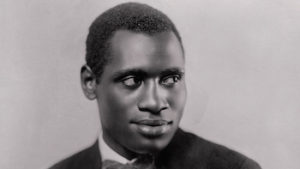
Paul Robeson
On this date, in 1898, Paul Robeson was born. He was a Black dramatic actor, singer, civil rights activist, political radical, and one of the most gifted men of the 20th century.
He was born in Princeton, New Jersey, the fifth and youngest child of Rev. William D. Robeson, a former escaped slave, and the former Maria Lousia Bustill. He lived in Princeton until 1907, when his father moved to Westfield, New Jersey, to become pastor of St. Luke's A.M.E. Zion Church. In 1910, the Robeson family moved to Somerville, New Jersey, when the Rev. Robeson became pastor of St. Thomas A.M.E. Zion Church. Paul graduated from Somerville High School in 1915.
He won a scholarship to Rutgers College, where he excelled academically, becoming a junior-year Phi Beta Kappa, a champion debater, and class valedictorian. He was equally triumphant on the athletic field, twice named an All-American in football. Robeson also lettered in baseball, basketball, and track, graduating in 1919, and briefly played in the early National Football League. His first role as an actor was in Oscar Micheaux's "Body and Soul," but he was most active on the screen between 1933 and 1942, a period in which he was prominently featured in Hollywood versions of "The Emperor Jones," "Show Boat," and "Tales of Manhattan." Robeson, however, was dissatisfied with his work in motion pictures.
In 1933, he undertook the study of several African languages. Robeson began to stress the positive aspects of African life. He rejected the assimilation that was prevalent among the Black elite. Yet Robeson saw this "return to Africa" as a spiritual rather than a literal journey and never abandoned his vision of an integrated society. In 1934, Robeson made the first of many visits to the Soviet Union. In 1939, Paul and his wife Eslanda returned to the United States, where he remained politically active. During World War II, Robeson committed his prodigious energies to supporting the Allied war effort and highlighted the Black struggle for equality in all his campaign speeches, even those he delivered, at considerable risk in the Deep South.
However, as the United States entered the Cold War, the Federal Bureau of Investigation (FBI) placed Robeson under surveillance as early as 1941 and compiled a massive dossier on his activities. In 1949, the House Committee on Un-American Activities (HUAC) announced that it would hold hearings to investigate Robeson and the loyalty of Black Americans. That same year, his concert was arranged in Peekskill, New York, but it was canceled because of a riot. In 1950, the State Department rescinded Robeson's passport, preventing him from performing or traveling abroad. At home, he was blacklisted by Broadway and Hollywood, concert halls and record companies, radio, and television. In 1957, after a seven-year delay, the State Department finally granted him a hearing on the revocation of his passport.
The result was a six-hour grilling but brought no change in the government's policy. Robeson fought his lonely battle at a significant personal cost. In 1958, he published "Here I Stand," a trenchant autobiography. A Supreme Court decision once again permitted him to travel abroad. Robeson dropped out of public awareness and was largely ignored by the leadership of the Civil Rights Movement, except for the young militant leaders of the Student Nonviolent Coordinating Committee (SNCC). Robeson's final public appearance was at a 1966 benefit dinner for SNCC.
To become an Actor or Actress.
To Become a musician or Singer.
African Americans/Voices of Triumph
by Dr. Henry Louis Gates Jr.
Copyright 1993, TimeLife Inc.
Image: Rutgers Special Collections and University Archives.